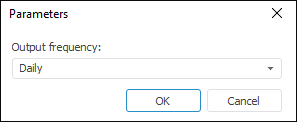 To apply the method
To apply the methodInterpolation is a method of calculating lower level data by processing upper level data. For example, quarterly data should be distributed by months.
Available interpolation methods:
Interpolation (Uniform). It disaggregates data using the uniform interpolation method.
Interpolation (Repeat). It disaggregates data by repeating values of source series frequency.
The methods are included into to the Aggregation group.
After applying the method the Parameters dialog opens:

Specify the output frequency of the calculated series in the Output Frequency drop-down list. The only available frequencies are those, which are less than frequencies of the series, for which the method is applied. For example, interpolation is calculated for a series that has quarterly frequency. The Output Frequency drop-down list will contain the Daily and Monthly available options.
A corresponding message is displayed if there are no available frequencies that can be used as an output frequency.
A series with the name of the <Method_name>(<Series_Name>) type and containing calculation results is added to the data table for each of the selected series. For example:

To change interpolation calculation method, use the Parameters tab on the side panel.

Select the required interpolation method in the Method drop-down list.
See also: